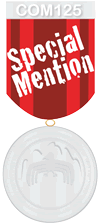
According to Rebecca Tushnet, author of Using Law and Identity to Script Cultural Production: Legal Fictions: Copyright, Fan Fiction, and a New Common Law, fan fiction is “any kind of written creativity that is based on an identifiable segment of popular culture such as a television show, and is not produced as ‘professional’ writing.” (McCardle, 2003) Thus, a fan fiction writer is someone who produces such literary work.
 Homepage of http://www.fanfiction.net
Homepage of http://www.fanfiction.netTo return to the discussion of online identities with regards to fan fiction, I refer to the fact that only the original creators get due credit for their work. Fan fiction writers such as myself have to depend solely on the online identity or pseudonym that we use, as well as, the fan fiction we produce, to build credibility and to gain a following for ourselves. To do this takes time and a dedication to creating literature that others like myself enjoy. Therefore, Judith Donath hits the bull’s eye when she writes that “one is far less inclined to abandon an online presence that had taken great effort to create” (Donath, 1996).
Reputation

My profile page on fanfiction.net
This means that I am able to communicate with my readers – answering whatever questions they may have about my work, giving them clues about future plot developments, or introducing them to my other writings. This ‘immediate’ and personal way of communicating with the very people who share my passion for a particular “canon”, makes my online identity more than just a name that appears on the screen but a real human being.
Identity Theft
The creation of “FelSong” as my online identity sets me apart from other fan fiction writers and enables fans of my works to easily search for my other writings. It also means that I am able to create a ‘name’ or a reputation for myself through my fan fiction not only through fanfiction.net but via related forums and my blog as well. My desire to gain more readers for my fan fiction through the creation of an online identity that seems real and credible is at odds with my desire to maintain my privacy. I refer to the Manifesto for the Reputation Society’s definition of the inbound reputation or “reputation that others have about me”, and its claim that the inbound reputation is a shifting balance between my right to privacy and the right to share and collaborate with others using this same reputation (Masum & Zhang, 2004). However, this is hard to do as I employ the same online identity throughout most of my online transactions or activities.

The loss of my privacy is one such risk I have to take if I wish to become a more accomplished writer. After all, “a key perk of being a fan fiction author is getting feedback from other authors and readers within the fan fiction community” (McCardle, 2003). This means, that I face an added risk of having my online identity stolen; a risk that grows as my reputation for writing good fan fiction grows as well. A person who wishes to steal my online identity has only to discover my password. With that password, they can easily flame other fan fiction authors using my pen name or post ‘troll’-like remarks on the forums I participate in. More importantly, they could post fan fiction under my name, possibly lowering the standards that my readers expect of me.
In conclusion, my online identity is something that I have carefully cultivated over the years, and am immensely proud of. It allows me to be easily recognized by those who read my fan fiction, and sets me apart from all the other fan fiction writers. Should this online identity ever be stolen, I would be hard pressed to create another online identity as I would need to invest time and effort into informing my readers of the theft and the subsequent change of my online screen name, as well as, reclaiming my writings as my own.
References
Donath, J. (1996, November). Identity and Deception in the Virtual Community. Retrieved on February 19, 2007 from http://smg.media.mit.edu/people/Judith/%20Identity/IdentityDeception.html
Masum, H., & Zhang, Y. C. (2004, July). Manifesto for the Reputation Society. First Monday, 9(7). Retrieved on February 19, 2007 from http://firstmonday.org/issues/issue9_7/masum/index.html
McCardle, M. (2003). Fan Fiction, Fandom, and Fanfare: What’s All The Fuss? Boston University, 9(2). Retrieved on February 19, 2007 from https://www.bu.edu/law/scitech/%20volume9issue2/McCardleWebPDF.pdf







